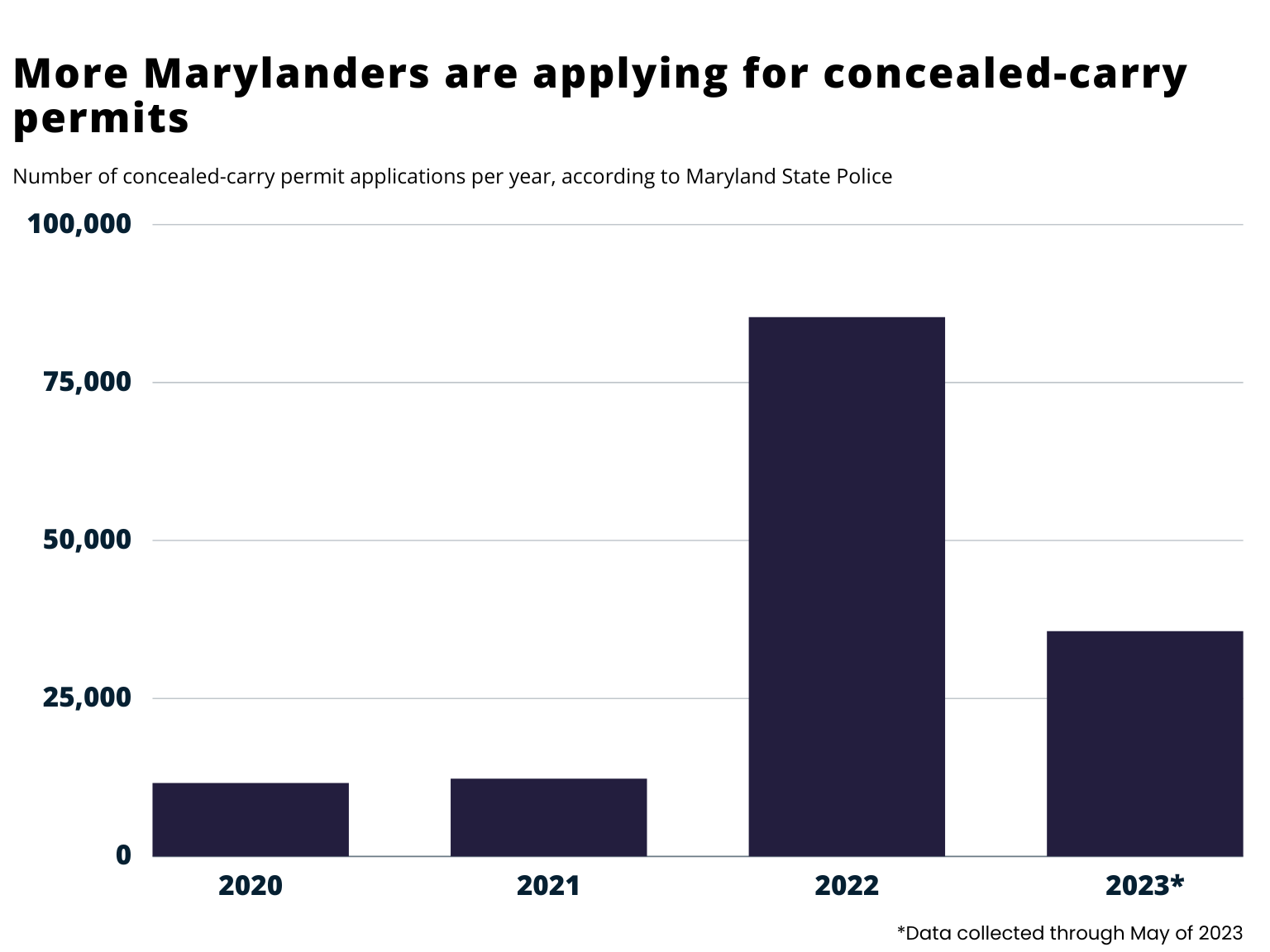Guns are increasingly part of public life in Maryland — whether you notice it or not — after a landmark Supreme Court decision last year made it easier for people to get concealed-carry permits.
The high court ruled last summer that states can’t keep citizens from carrying guns in public for subjective reasons and they must list, categorically, why certain people can’t conceal carry a gun. This struck down laws across the county that barred people from carrying a concealed gun for “good and substantial reasons,” including one in Maryland.
In the wake of the New York State Rifle and Pistol Association v. Bruen case, the number of applications for concealed-carry permits in Maryland skyrocketed from around 12,000 in 2021 to more than 85,000 applications in 2022, according to data obtained from Maryland State Police.
It’s a trend that’s continuing into 2023, with more than 35,000 people asking for their permit so far.
Cassandra Crifasi, co-director of Johns Hopkins Center for Gun Violence Solutions, said she saw this spike coming.
“I wasn’t surprised,” Crifasi said. “Honestly, it could have been an even higher number.”
From a public health perspective, Crifasi said the groundswell of concealed carry permits in Maryland isn’t good for safety.
“The evidence generally shows that when you make it easier for people to carry guns in public, we see harms to public safety. We see increases in crime and violence,” Crifasi said. “When we’re introducing guns into more spaces, altercations and interactions that otherwise might have resulted in a verbal discussion, or even maybe a physical altercation, now may be more likely to result in serious injury or fatality because of the presence of a firearm — and firearms are exceptionally lethal.”
Maryland Gov. Wes Moore said that’s why he signed bills in to law that limit where people can carry their firearms, barring them from wearing, carrying or transporting a gun in an “area for children or vulnerable adults,” such as a school or health care facility.
“In Maryland, we refuse to say these problems are too big or too tough,” Moore said. “We will act, and that’s exactly what today represents,” he said earlier this month, when he signed the bill into law.
To Crifasi, the effectiveness of the new law depends on enforcement.
“It all comes down to implementation and making sure that we are applying the law equitably across the population, and really holding people accountable when they violate the law,” the Johns Hopkins public health professor said. “When people are carrying in places where they shouldn’t — because we have decided it’s too risky for people to carry concealed firearms, and then they’re not held accountable for that — that sends the wrong message and makes this policy really have no teeth.”
But the National Rifle Association doesn’t want there to be any bite at all. In the hours after Moore signed the bills into law, the NRA sued Maryland, vowing a battle in court.
“It is vital for law-abiding Marylanders to have an effective means of defending themselves and their loved ones,” Randy Kozuch, executive director for the NRA’s Institute for Legislative Action, said in a statement. “Our laws should burden criminals and aid good, lawful people. It is evident that those in power in Maryland care more for criminals and less for the law-abiding.”
This sort of reason doesn’t line up with the research, Crifasi said.
“If we applied that sort of framework or that logic to any other type of crime, people would laugh,” Crifasi said. She mimicked this line of thinking, “‘People still murder each other. So why are we regulating law abiding citizens? Criminals are still going to go off and murder people.’ That just logic doesn’t really hold.”
Further, Crifasi said her research shows tighter gun laws do make it harder for criminals to get their hands on guns.
“When you ask people involved in the underground gun market what impact requiring people to get a license has on the local sources — the guns are more expensive, people are not willing to engage in straw purchase, and they specifically cite Maryland’s requirement that people who want to buy a gun get a license first,” Crifasi said.
The new law will take affect Oct. 1.
In the meantime, Crifasi said it’s important to bring the conversations around gun violence out of the political realm and into the interpersonal one, as more guns circulate in the region.
“Firearms are the leading cause of death for kids aged zero to 19,” Crifasi said. “If you are a parent of kids, and you’re sending your kids to another friend’s house to play, ask, ‘Do you have guns in the home? And are they stored safe and secure?'”
It’s no different from asking another parent about peanuts in the home, if your child has an allergy, Crifasi said.
“It’s far more likely that this would sort of start a very productive conversation and get that person thinking, ‘Gosh, you know, maybe I do need to think about the way I’m storing my firearms,'” Crifasi said.









